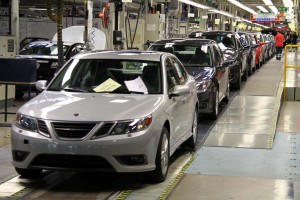Despite the appearance of two Chinese white knights, the situation continues to deteriorate for Saab, the struggling Swedish automaker missing a payday for 3,800 of its employees.
On Monday, Saab officials met with workers at the company’s Trollhattan assembly plant and advised them not to return to work until July 4. The plant has been out of operation since June 8 due to problems paying suppliers. A prior boycott by partsmakers had led to a two-month shutdown that only ended in late May.
The latest short-term crisis raises further concerns about Saab’s long-term viability, one analysts warning, “Time is a luxury it no longer has.”
“Swedish Automobile N.V. (Swedish Automobile, formerly Spyker Cars N.V.) announces that Saab Automobile AB (Saab Automobile) will be unable to pay the wages to employees as it has not yet obtained the necessary short-term funding,” Saab’s parent company said in a release this morning.
The maker’s financial problems have been ongoing for some time, a key reason General Motors decided to sell off or close the brand after its 2009 bankruptcy. A last-minute deal with what was then Spyker Cars saved the maker, but the new owners had to wait seven weeks before they could get the headquarters assembly plant running again. That led to a shortfall in sales, Saab Chairman Victor Muller has complained, which, in turn, created the latest cash crunch.
Several efforts to raise money earlier in the year collapsed, including a proposed sale to the small Chinese carmaker Hawtai. The Swedish maker now is working to finalize a new partnership pairing it with Pang Da, the largest Chinese auto retail network, and Zhejiang Youngman Lotus Automobile Co., a Chinese automaker.
The problem, says analyst David Sullivan, of AutoPacific, Inc, is that, “they have to go through all these European bureaucracies to get approval. The red tape may take longer than Saab has left. Time is a luxury it no longer has.”
Though Saab does have some product on dealer lots around the world, the maker had already booked payment for those vehicles once they rolled out of the plant. With production likely to remain halted for at least another several weeks, that means there’s likely to be no money coming in for some time.
Saab officials are still hoping they can pull off their three-way alliance as it would generate 245 million Euros, or $350 million, in cash. But it would also transfer a majority ownership of the Swedish company to the two Chinese firms.
Sullivan warns that even if Saab does eventually get some funds in its bank account the maker will likely find it has lost a lot of employees who defected “because they need to feed their families.”

